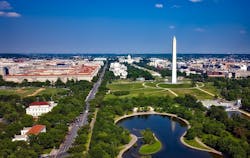Pruitt Now Sole Decision Maker Regarding Clean Water Act Determinations
According to a leaked memo obtained by CNN, U.S. EPA administrator Scott Pruitt is now the sole individual in control of key provisions in the Clean Water Act. In the memo, Pruitt states that he will make the critical choices regarding the the preservation of streams, ponds and wetlands.
The memo was provided by Public Employees for Environmental Responsibility and was dated March 30, 2018. Ordinarily, Clean Water Act decisions are made at the discretion of regional EPA offices, but within the memo Pruitt directs these offices to “cede their Clean Water Act determinations” to him, according to Kyla Bennett, New England director of Public Employees for Environmental Responsibility.
Ostensibly, this rearrangement of power lessens the opinion of scientists and EPA employees in evaluating the significance of environmental projects relating to waterways and wetlands. Ordinarily, projects under the Clean Water Act must receive permits from the Army Corps of Engineers which are then reviewed for final approval by regional EPA offices. Now, such permits must be approved by Pruitt himself.
“Now a man in D.C. who knows nothing about local environmental conditions will be making the decisions about wetlands and waterways he’s probably never seen,” Bennett said. This action safeguards for clean water across the U.S. to filtration through one politician’s hands. Every corporation that wants a pass on Clean Water Act compliance is invited to privately meet with the most user-friendly EPA administrator in history.”
Liz Bowman, a spokesperson for EPA, explains the new development in a statement.
“This memo explains that jurisdictional determinations that raise significant issues or technical difficulties should be handled in a consistent and uniform manner, particularly during the (Waters of the U.S.) rulemaking,” Bowman said. “EPA’s regional administrators will still need to be involved in this process; regions will work closely with the administrator’s office when doing the work to assess jurisdiction for very select, and often rare, cases.”
This development follows Pruitt’s previous plans to significantly reduce the scope of the protected “Waters of the United States” rule. This rule details the jurisdiction the Clean Water Act provides, with Pruitt planning to shrink such standards by as much as two-thirds.
